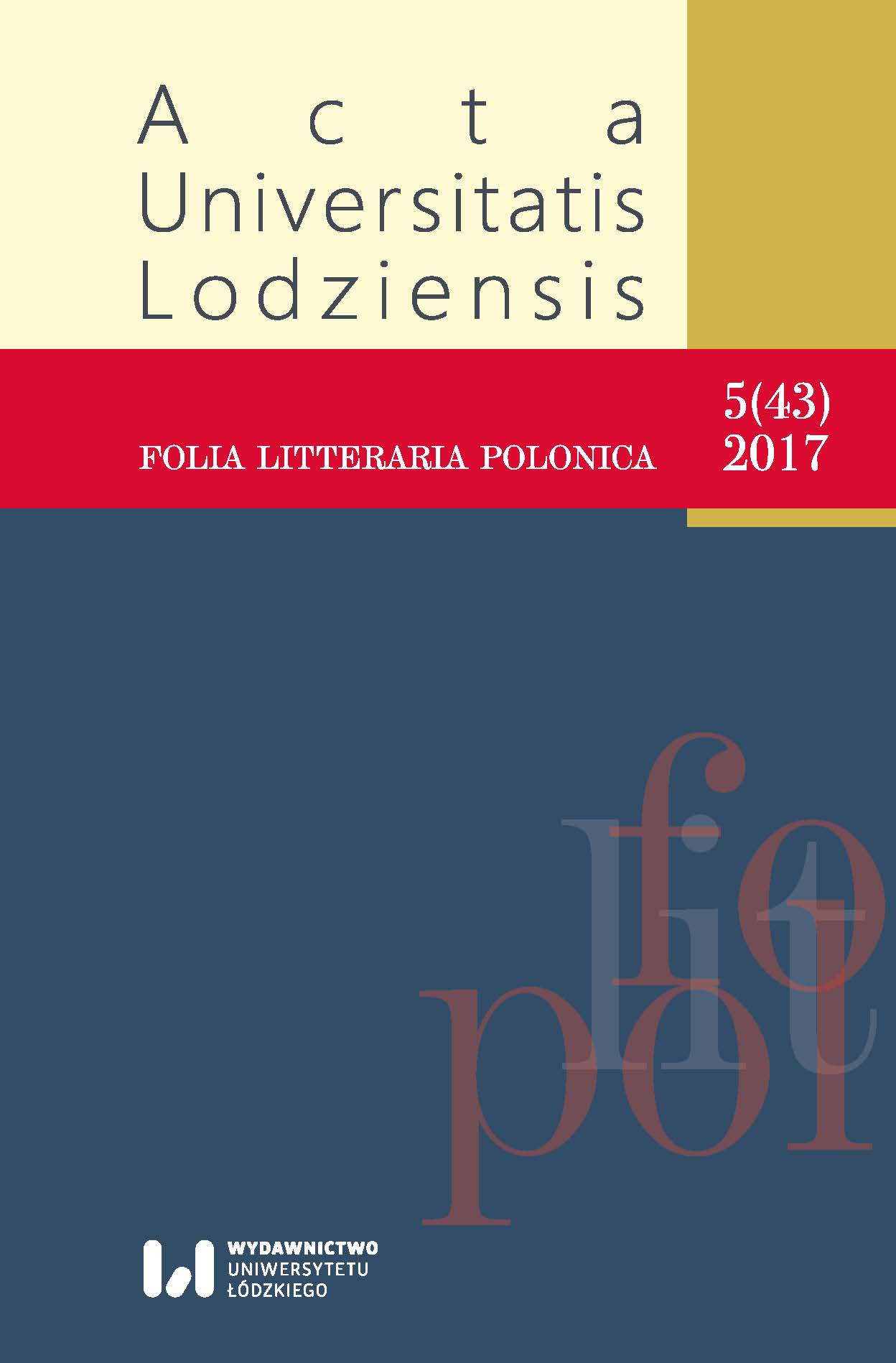Rhetoric appropriateness in view of contemporary media communication and journalism
DOI:
https://doi.org/10.18778/1505-9057.43.03Keywords:
rhetoric, prépon/aptum, decorumAbstract
In the article, I present deliberations on the theme of the rhetorical category of appropriateness in the context of its original sources and contemporary media practice. Upon presenting the theory formed in line with the understanding developed in antiquity, I accept as a functional division for the purpose of the discussion the prépon/aptum (decorum) division, i.e. into the historical and literary notion, and appropriateness as a general principle of rhetorical communication to subsequently present a discussion organised on the basis of three theses: 1) The major factor defining the rhetorical model of appropriateness is the mass nature of media communication in the presence of freedom of speech, a democratic system of authority, and economic liberalism; 2) The on-going presence of disputes regarding the appropriateness of public behaviour is a manifestation not as much of its norm-building potential as of the functional approach – of senders, participants of the reported events, and message receivers – towards media communication, which inevitably results in a distinct over-representation of messages the content of which applies to the manifestations of inappropriateness; 3) The appropriateness principle is associated with the difficult task for the receiver to understand her/his role in the world of the media, and its various consequences. I posit that the principle does, in fact, indicate certain criteria which can become a basis for classifying specific messages as those which do or do not meet the requirements of rhetorical tact, yet it does not enable one to define an a priori applicable borderline between appropriateness and inappropriateness in contemporary media. Therefore, it seems that the settlement of any doubts and dilemmas associated with appropriateness ought to be founded on a good upbringing-based social stance and a system of values, i.e. maturity achieved regardless of the influence of the media.
Downloads
References
Asmuth B., “Angemessenheit” [entry], in: “Historisches Wörterbuch der Rhetorik”, G. Ueding et al. (eds.), Vol. 1, Wissenschaftsverlag De Gruyter, Tübingen 1994, col. 580.
Google Scholar
Gill A.M., Whedbee K., “Retoryka”, in: “Dyskurs jako struktura i process”, T.A. van Dijk (ed.), selection and trans. G. Grochowski, T. Dobrzyńska (ed. of Polish translation), Wydawnictwo Naukowe PWN, Warsaw 2001, pp. 182–213.
Google Scholar
Godzic W., “Chamstwu mówimy ‘nie!’ – i ‘kto to mówi’”, in: “Internetowa kultura obrażania?,” K. Krejtz (ed.), 2012, p. 11, http://www.komentujnieobrazaj.pl/kno/ko-raport.pdf [accessed on: 24.05.2017].
Google Scholar
Goffman E., “Zachowanie w miejscach publicznych. O społecznej organizacji zgromadzeń”, editing, foreword to the Polish edition by G. Woroniecka, transl. by O. Siara, Wydawnictwo Naukowe PWN, Warsaw 2008.
Google Scholar
Karwat M., “O złośliwej dyskredytacji. Manipulowanie wizerunkiem przeciwnika”, Wydawnictwo Naukowe PWN, Warsaw 2006.
Google Scholar
Korolko M., “Sztuka retoryki. Przewodnik encyklopedyczny”, 2nd edition amended, Wiedza Powszechna, Warsaw 1998.
Google Scholar
Kostkiewiczowa T., “Myśl literacka polskiego oświecenia (zarys problemów badawczych)”, in: “Oświeceni o literaturze. Wypowiedzi pisarzy polskich 1740–1800”, T. Kostkiewiczowa, Z. Goliński (eds.), Warsaw 1993, p. 7–34.
Google Scholar
Kowalski S., “O sejmowej antyetykiecie”, in: “Zmiany w publicznych zwyczajach językowych”, J. Bralczyk, K. Mosiołek-Kłosińska (eds.), Rada Języka Polskiego przy Prezydium PAN, Warsaw 2001, pp. 85–91.
Google Scholar
Kraśko N., “NIE, czyli poza granicami przyzwoitości”, in: “Cudze problemy. O ważności tego, co nieważne. Analiza dyskursu publicznego w Polsce”, M. Czyżewski, K. Dunin, A. Piotrowski (eds.), Wydawnictwa Akademickie i Profesjonalne, Warsaw 2010, pp. 211–232.
Google Scholar
Lausberg H., “Retoryka literacka. Podstawy wiedzy o literaturze”, trans., editing and introduction: A. Gorzkowski, Homini, Bydgoszcz 2002.
Google Scholar
Lichański J.Z., “Retoryka od średniowiecza do baroku. Teoria i praktyka”, Wydawnictwo Naukowe PWN, Warsaw 1992.
Google Scholar
Meyer M., Carrilho M.M., Timmermans B., “Historia retoryki od Greków do dziś”, M. Meyer (ed.), transl. by Z. Baran, Warsaw 2010.
Google Scholar
Michałowska T., “Średniowieczna teoria literatury w Polsce. Rekonesans”, Wydawnictwo Uniwersytetu Wrocławskiego, Wroclaw 2007.
Google Scholar
Müller J.D., “Decorum. Konzepte von Angemessenheit in der Theorie der Rhetorik von den Sophisten bis zur Renaissance“, Berlin–Boston 2011.
Google Scholar
“NaTemat.pl”, Press 2012, Issue 4, p. 18.
Google Scholar
Peisert M., “Formy i funkcje agresji werbalnej. Próba typologii”, Wydawnictwo Uniwersytetu Wrocławskiego, Wroclaw 2004.
Google Scholar
Reale G., “Myśl starożytna”, transl. by E.I. Zieliński, Wydawnictwo Katolickiego Uniwersytetu Lubelskiego, Lublin 2003.
Google Scholar
“Rozmowa dnia – 18 lipca”, with J. Wasilewski interviewer A. Głąb, 2011, http://www.sdp.pl/wywiady/4327,rozmowa-dnia-18-lipca,1315604197 [accessed on: 24.05.2017].
Google Scholar
Rutherford I., L.G., “Decorum” [entry], in: “Historisches Wörterbuch der Rhetorik”, G. Ueding et al. (eds.), Vol. 2, Wissenschaftsverlag De Gruyter, Tübingen 1994, col. 423.
Google Scholar
Styka J., “Kategoria stosowności (decorum) w rzymskiej teorii literackiej”, Prace Komisji Filologii Klasycznej 1995, Issue 23, R. Turasiewicz (ed.), pp. 85–99.
Google Scholar
Szczęsna E., “Grzeczność zobowiązuje, niegrzeczność prowokuje – o grzeczności i stosowności w reklamie”, in: “Formy i normy stosowności. Tom poświęcony literaturze okolicznościowej i użytkowej”, Napis, series 10, Wydawnictwo DiG, Warsaw 2004, pp. 307–316.
Google Scholar
“Teorie komunikacji i mediów 6. Poprawność i stosowność w komunikacji”, M. Graszewicz (ed.), Oficyna Wydawnicza Atut, Wroclaw 2013, pp. 99–111.
Google Scholar
Ulčinaitė E., “Teoria retoryczna w Polsce i na Litwie w XVII wieku. Próba rekonstrukcji schematu retorycznego”, Zakład Narodowy im. Ossolińskich, Wroclaw 1984.
Google Scholar
Ziomek J., “Retoryka opisowa”, 2nd edition amended, Zakład Narodowy im. Ossolińskich, Wroclaw 2000.
Google Scholar











